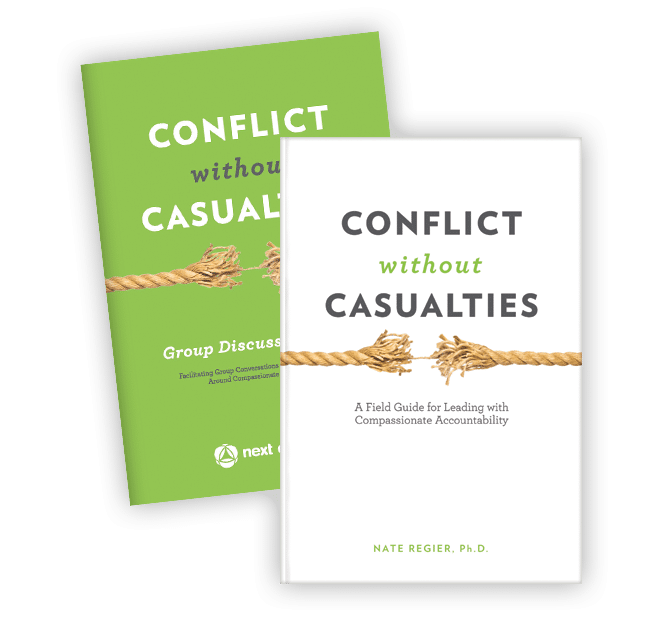
Conflict Isn’t The Problem
Share viaConflict has a really bad rap. At almost every speaking engagement I ask the audience what comes to mind when they hear the word “Conflict.” Almost universally, there is a negative reaction. Phrases like, “Somebody gets hurt,” “I hate it!” or “Run away!” are typical responses.
For many people conflict is synonymous with casualties. They’ve experienced so many situations where key people in their life handled conflict in a destructive way that they now think conflict is bad. Something to be avoided at all costs.
The myth of conflict mediation, management, and reduction
The problem with conflict mediation, conflict management, and conflict reduction is that each on positions conflict as the culprit.
Whether intended or not, these labels and much of the methods used in these industries reinforced the myth that if we can “de-escalate” the conflict, things will be better.
The problem is not the conflict. The problem is the casualties.
Conflict is simply the energy generated by the gap between what we want and what we are experiencing at any given point in time.
That energy can motivate people to do incredible things – both positive and negative. It motivated Michael Phelps and Katie Ledecky to exert herculean effort to win gold at the Olympics. Want to see how Katie trains? It also motivates members of ISIS to go to great lengths planning and waiting for the right moment to strike.
When we mediate, manage, or reduce the conflict, we necessarily reduce the energy available for productive problem-solving. When we respect the tension and use that energy to create instead of destroy, the results can be transformative.
Instead of trying to eliminate conflict, ask how it can be used to create something amazing.
Michael Meade believes that the purpose of conflict is to create. If that’s true, then why do we work so hard to eliminate it? Probably because we don’t know how to engage it without casualties.
The key to conflict without casualties is to create a holding environment where the energy of conflict can create instead of destroy.
An arena for creative conflict
Next Element’s Cycle of Compassion could be thought of as an arena for creative conflict. It’s a space defined by Openness, Resourcefulness, and Persistence and a set of ground rules that allow differences and disagreements to generate rather than tear down.
I’ve heard it said that creativity happens at the edge of destruction. Our model of compassionate accountability recognizes the danger of drama and that it’s our human nature to go there. It also provides opportunities for leveraging our best selves to redirect the energy towards something amazing.
Here’s an example of one person’s results on the Drama Resilience Assessment. Notice how the Compassion Cycle sits within the Drama Triangle, representing cohesion, balance, and centeredness. The arrows represent the constant movement and dynamic energy necessary to practice compassionate accountability. If we stop moving or rely too much on only one skill, it’s easy to slip off into the dark side of our human nature. The corners of the triangle represent the increasing limitations and corners created by drama.
Yes you can!
People who take our online course are amazed at the insights and new perspectives they gain in a very short period of time. Our certified Leading Out of Drama practitioners are delighted at the positive results from using the Formula for Compassionate Conflict.
For all those people who’ve been burned by the casualties of conflict, we have a message of hope. It’s possible to reclaim that energy and learn new ways of walking into the arena of conflict while preserving the dignity of all involved.
Copyright 2016, Next Element Consulting, LLC
 Get our latest book Conflict Without Casualties: A Field Guide for Leading With Compassionate Accountability. This book is the foundation for our Leading Out of Drama program, a comprehensive system for building cultures of compassionate accountability.
Get our latest book Conflict Without Casualties: A Field Guide for Leading With Compassionate Accountability. This book is the foundation for our Leading Out of Drama program, a comprehensive system for building cultures of compassionate accountability.
![]() Subscribe to Dr. Regier’s free podcast
Subscribe to Dr. Regier’s free podcast
Book Your Next Keynote Speaker

Author and Co-founder of Next Element, Dr. Nate Regier is available to speak at your upcoming event.
Submit a Speaker RequestPodcast: Listen to Nate "On Compassion"
 Listen to the Podcast
Listen to the Podcast




0 Comments
Add comment